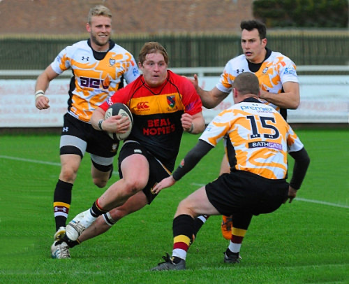Whether you’re a senior government minister – or someone who needs to speak on behalf of your organisation – it’s essential to think things through before you do a media interview.
This especially applies when you’re doing an interview on a potentially tricky or contentious subject.
Take, for example, the ever-so-touchy – or perhaps “non-touchy” – topic of sex during a pandemic.
This may well not be on your company’s media interview agenda, but it is on the radar of the British Government.
For health and safety reasons, the government’s message seems to be “No British casual sex please, we’re in a crisis”.

On any thorny topic like this, you will set yourself up to appear far more credible if you prepare thoroughly for the likely tough questions BEFORE you go anywhere near a camera, a microphone or a reporter’s notebook.
And when you think things through thoroughly in advance, you’ll be in a stronger position to sound and look impressively in control when you’re answering those probing follow-up questions.
One government minister – who is now well-placed to tell you that preparation before an interview on a topic like this is essential – is the British Health Secretary, Matt Hancock.

He came out the worse for wear after challenging questioning on sex during Corona Times where he gave a series of uncertain, awkward and seemingly unplanned replies.
MATT HANCOCK VERSUS KAY BURLEY
Mr Hancock was being interviewed on Sky News by the often provocative – and sometimes cunningly beguiling – presenter, Kay Burley.

Kay Burley asked him about what she labelled as Matt Hancock’s ban on casual sex in the UK.
While Mr Hancock doesn’t exactly call it this himself, he is trying to stamp out casual sex across Britain during Corona Times.
However, Matt Hancock maintains sex is a fine activity for those who are in what he calls “an established relationship”.
So the big question which aroused Kay Burley’s curiosity involved what exactly constitutes “an established relationship”.
When dealing with her persistent inquiries about this, Mr Hancock struggled and strayed.
During a frustrating moment he defined an established relationship as, er, “one that’s well established”.
Hurrah for this gem of enlightenment!
At another point Mr Hancock’s answer to what constitutes an established relationship is: “It means you have to be sensible”.
BEWARE THE “BODY-SWERVE”
It’s an unusual interview in that while Matt Hancock is chided by Kay Burley, it’s conducted for the most part in a largely jovial manner.
In fact, both interviewer and interviewee received social media and tabloid newspaper criticism for giggling while discussing an essentially serious topic on national TV.

Feel free make up your own mind about the giggling issue in this instance.
But be aware that the rule I teach is that your on-air behaviour and facial expressions need to be in line with the message you’re seeking to get across at every moment.
Amidst the giggles, Mr Hancock’s failure to give a more precise definition on exactly what constitutes an established relationship led Ms Burley to accuse him at one point of trying to get around the key question.
“You’ve body-swerved the ‘established relationship’, haven’t you, because you don’t really know what that means. Anybody can bend the rules on that, can’t they?” Kay Burley complained.

However, still no enlightening Hancock definition was forthcoming.
You can try to work out what the Health Secretary might be mean by “established relationship” by watching the Hancock versus Burley encounter here.
MEDIA TRAINING TO AVOID BODY-SWERVING AND OTHER SINS
Whenever you’re advocating something that’s potentially unpopular, controversial and/or difficult to define, then preparing in advance for inevitable tricky questions is vital.
It’s something that I make sure clients are thoroughly prepared for when they take part in media training sessions – whether the sessions are conducted on line or face-to-face.
Either way, rigorous media training involving blowtorch-on-the-belly questioning for your own good enables you and your team to stand up to the worst possible questions – by helping you to work out the best possible potential answers in advance.

This equips you to give straight, effective and engaging answers which are helpful to your questioners – and also to effectively get across the message which you’re seeking to impart.
In Corona Times, to make sure media training sessions are as safe as possible, I and my colleagues can run them in back gardens, carparks or other well-ventilated places.

When sessions need to be conducted indoors for protection from the weather, then the mock interviews and other vital training exercises can be done on a socially distanced basis – just as we’re getting used to seeing interviews being conducted at a distance on TV.

There’s more on media training at:
http://www.michaeldoddcommunications.com/media-master-classes/
And there’s more on great answers sessions at:
http://www.michaeldoddcommunications.com/give-great-answers-to-tough-questions/
Great answers involve dealing directly with the question – and, when necessary, explaining WHY you’re unable to give an immediate answer.
When you do this, your audience can at least understand the reason why you can’t give the exact information being sought on the spot – whether it’s to do with matters of client confidentiality, or because your organisation is still researching the matter, or whatever it is.
Great answers also involve saying things that are profoundly helpful and/or fascinating for your questioners – and your media viewers, listeners and readers beyond.
Detail of the golden formulae for giving impressive responses are set out and explained in “Great Answers To Tough Questions At Work” at:
When you can give truly great answers, it’s unlikely anyone will ever be able to accuse you of conducting a Hancock-like body-swerve!


